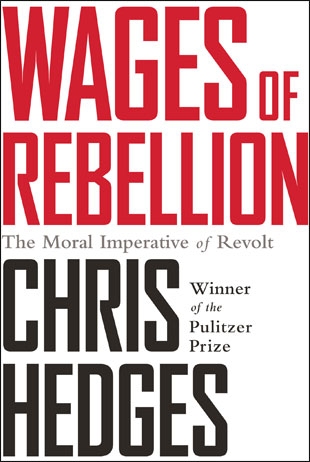"We live in a revolutionary moment," writes Chris Hedges, a Pulitzer Prize-winning journalist whose last three books have probed the decline of cultural, political, and economic systems. Much of the wealth of the world is in the hands of "global oligarchy" that savages the earth, makes the most of cheap laborers, taps into the raw power that holds governments in thrall, and threatens the survival of the human species.
Looking back at history, Hedges points out that most successful revolutions are nonviolent and that they not only are dependent on strong leadership but also strong emotional identification with new possibilities. Revolutionary movements spread like ripples in a pond: the American Revolution of 1776 was a catalyst to the French Revolution of 1789 which then crossed the ocean for the Haitian Revolution. Some of these ripples can be seen in the Arab Spring and the Occupy movement.
Hurricane Sandy in the U.S. revealed the inequality gap between the rich and the poor and showed just how broken the nation had become. Hedges predicts that climate change will trigger mass migrations and battles for dwindling resources. Using illustrative material from the works of novelists, historians, and philosophers, he points to the emptiness of consumerism and capitalism; he quotes Walter Benjamin
who calls these twin forces "a religion which offers not the reform of existence but its complete destruction."
Even in the face of such depressing prospects, Hedges refuses to leave us feeling helpless and hopeless. He affirms the courage of abolitionists, African Americans, suffragists, workers, and antiwar and civil rights activists who fought for equality and social justice. He also finds hope in the prophetic voices of Abu-Jamal, the prison activist, and in the writings of philosopher Cornel West.
Hedges laments the strong role played by violence both in past and present eras and the fact that there are some 310 million firearms in the United States. But instead of railing against guns, the author takes his hat off to whistleblowers like Julian Assange and those involved in anti-fracking protests in Canada.
Rebels are out there protesting and going to prison for "their sublime madness." We need to keep them close to our hearts as we do what we can to heal the planet and to make steps toward the flourishing of peace, freedom, and justice for all.
